Gas fireplace in interior design
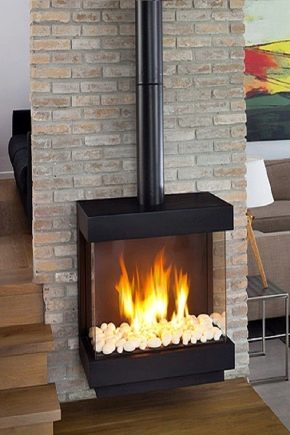
As you know, you can look at a burning fire endlessly. This is partly why fireplaces are gaining more and more popularity among owners of private houses and apartments. One of the modern, safe and economical options is a gas fireplace.
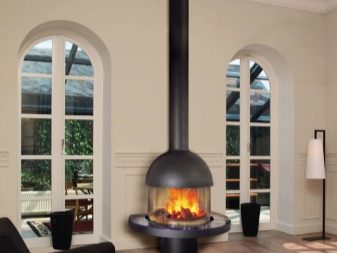
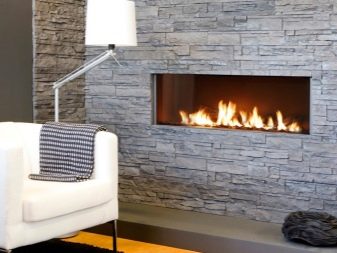
Peculiarities
The gas fireplace has a special burner that provides a burning effect and is located in a cast iron body. The latter is protected by heat-resistant glass.
The fuel is propane-butane or regular gas used for cooking. For convenience, the fireplace can be connected to the existing system and kitchen ventilation. However, it is allowed to use a separate cylinder for him.
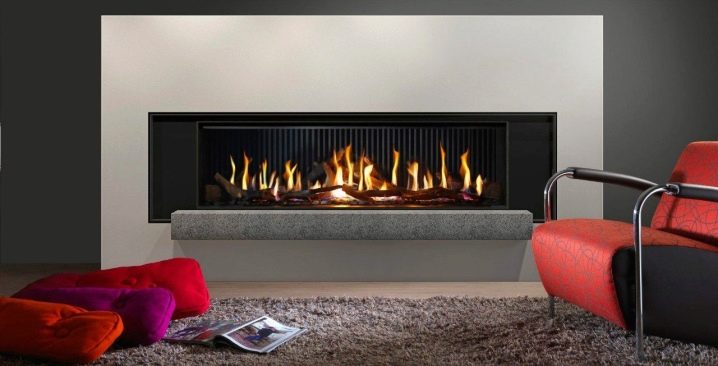
Gas fireplaces have a number of advantages.
- Increased efficiency indicators - 85% and high power, amounting to 10-15 kW. Gas combustion temperature - 500-650C. This allows the use of heating equipment. In addition, by distributing the blowers throughout the apartment, heat is distributed everywhere. Moreover, it does not go up (as it happens when heating with wood-burning counterparts), but inside the room.
- Safety, that is, gas leakage and escaping sparks are excluded due to the use of a sealed chamber.
- Lack of soot and soot, smoke, the need to organize a place for storing firewood.
- Easy to install due to low exhaust gas temperature (150-200C). It is in this connection that it is possible to simplify the organization of the chimney.
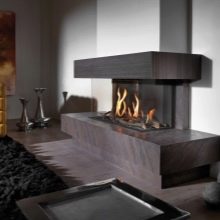
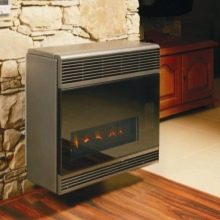
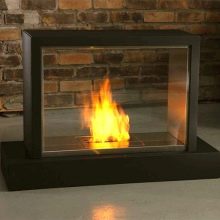
- Simplicity and automation of combustion processes - you can ignite the furnace using the remote control button or by turning the thermostat slider.
- The variety of sizes and shapes of gas equipment, which is due to the lack of the need to use solid fuel.
- The possibility of using bottled or main gas, which expands the possibilities of using the fireplace.
- Exact imitation of the flame, as well as the ability to adjust its power.
- High heating rate of the fireplace - it takes only a few minutes after switching on for it to start heating the room.
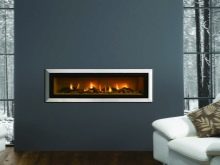
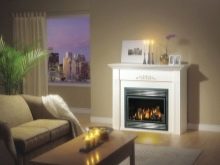
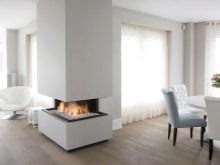
Views
There are many types of gas fireplaces. Their classification can be based on various characteristics.
Depending on where in the apartment or country house the device is mounted, it can be of several types.
- Corner. They are mounted in the corner of the room, well suited for small rooms, since they are ergonomic and compact.
- Built-in they are also compact, since they are mounted in a wall niche - homemade or ready-made. The portal must be finished with non-combustible materials, the fireplace is connected to the chimney.
- Wall fixed to the wall with brackets. Ideal for families with small children and animals that can burn themselves.
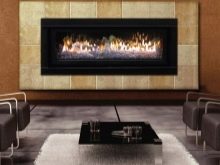
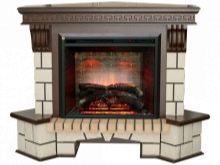
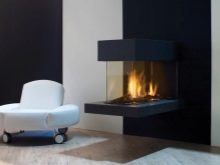
- Floor installed on a pre-assembled base and connected to the chimney. It can be in the form of a table, for which such devices are called fireplaces-tables.
- Frontal. Based on the name, it is clear that it is mounted in the center of the room.
- Open or streetinstalled in open areas (in gazebos, verandas) do not require a chimney.
For private buildings, you can choose any version of the fireplace, since the chimney can be "run" through walls or ceilings. For an apartment building, front and corner versions are chosen, which are placed near or along the outer walls. A chimney is mounted through them.
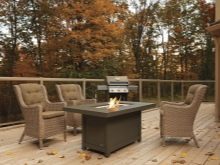
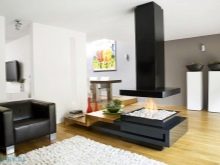
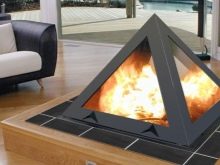
If we talk about the possibility of transporting equipment, then there are:
- stationary, that is, those fireplaces that are not subject to further transportation after installation;
- portable are a small stove that can be rearranged from room to room.
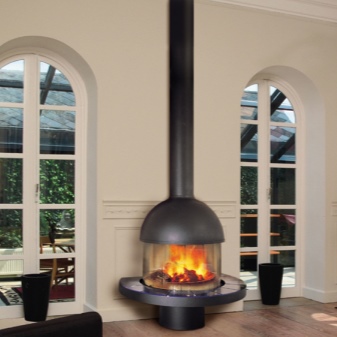
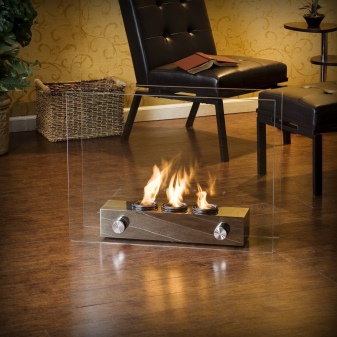
When the classification is based on power characteristics, then fireplaces can be classified into the following groups:
- high power;
- medium power;
- low power.
On average, for heating 10 sq. m the fireplace should give 1 kW. Manufacturers indicate not only the power of the device, but also prescribe the maximum area of the room that can be heated. However, when the fireplace is used only in summer (for example, at night) or as an additional source of heating, then 1 kW is enough for 20-25 sq. m area. Finally, when choosing a device solely for decorative purposes, you can ignore the indicators of its efficiency.
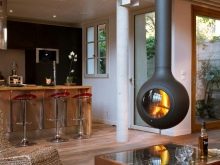
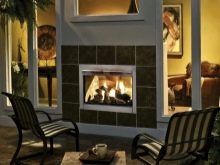
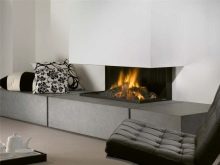
Based on the type of fuel used, gas fireplaces are divided into those that work:
- on domestic gas - devices operating on this type of fuel are marked "N";
- on propane-butane (assumes the presence of a gas cylinder) - devices have the letter "P".
Depending on the appearance, equipment is distinguished for the fuel hole:
- with open fireboxes - characterized by low efficiency (16%), but the ability to observe the burning flame at any time;
- with closed fireboxes - have a closing glass door, due to which the efficiency of the fireplace reaches 70-80%, while, if desired, the door can be left open and admire the fire blazing from the burner.
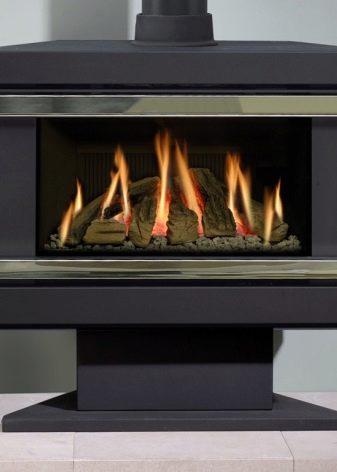
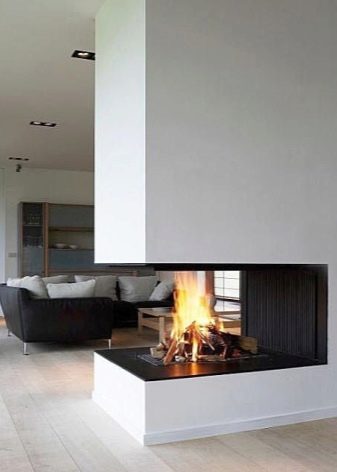
Depending on the direction of the radiated heat, fireplaces are:
- one-sided radiation - considered the most effective (maximum efficiency), and therefore the most common;
- double-sided radiation - less effective, have more decorative function, require a large amount of fresh air in the room;
- three-sided - they are distinguished by aesthetic appeal and a variety of forms, but have little heat transfer;
- fireplaces with a heat exchanger, which include a heat block and pipes through which heat is transferred throughout the house. The coolant is water (in winter it can be antifreeze), which moves from the heating block through the pipes.
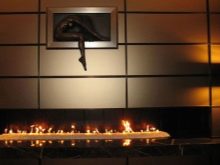
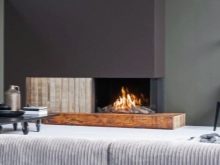
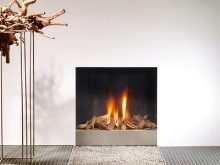
Depending on the material from which the firebox is made, fireplaces can be:
- Steel - have a short service life, since the condensate released during the combustion of gas quickly destroys the material.
- Cast iron are characterized by greater resistance to the effects of condensate, since they contain graphite, while such models are heavier and more expensive.
- Made of "stainless steel", which is resistant to acids, they have the longest service life compared to the two previous options, and therefore the highest cost.
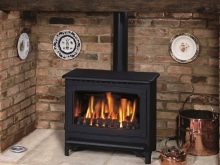
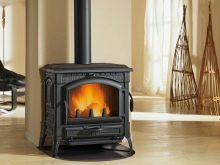
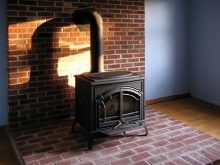
Based on the characteristics of the forms and functioning, there are several more types of fireplaces.
- Made of cast iron or steel - they have an outer surface lined with heat-resistant bricks and a door made of heat-resistant glass. The indicator of full efficiency is 50%.
- Fireplace boilers are rather heaters with portals. Outwardly, the device looks like a fireplace, its power can be regulated.
- Infrared devices that heat a room with infrared waves or by heating a ceramic plate are characterized by safety, no ash. They operate on propane-butane, suitable for both indoor and outdoor installation.
- Convectors are another type of heater that looks like a fireplace.
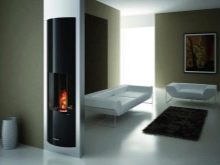
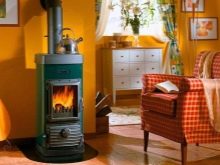
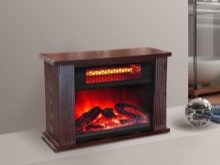
All of these models can have a more or less wide range of additional systems, be equipped with various lighters, and have additional accessories.
How to do it yourself?
Depending on the type of device, its installation can be done by hand or by an outsourced specialist.
Do not forget that the installation of a gas fireplace requires approval from the regulatory authorities, with the exception of outdoor fireplaces.
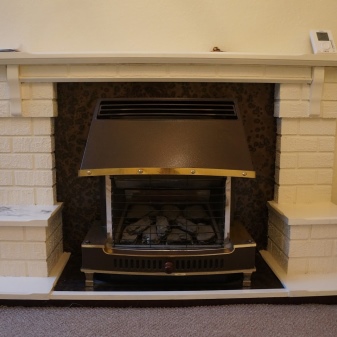
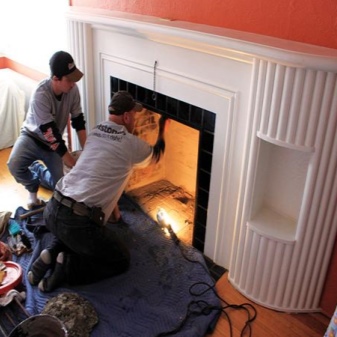
When connecting a trunk type of equipment, you must trust it to a gas service specialist, because even kitchen stoves require professional connection. And if the fireplace is not properly organized, there is a high risk of gas leakage.
When self-made installation of equipment, it is necessary that all its elements meet the following requirements:
- gas pipes should not be mounted into the wall, but only pass along the surface of the walls;
- all connections must be tight to avoid gas leakage;
- the premises where the installation is planned must have a good ventilation system;
- the firebox should not be located in a draft;
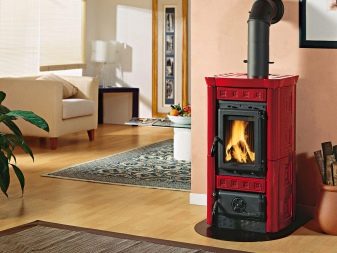
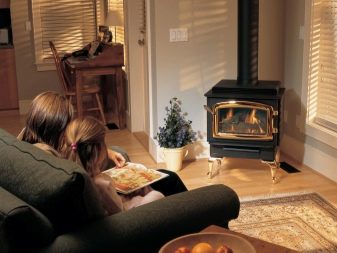
- to the place where the convector or any other type of device will be located, it is necessary to supply electricity. Without it, it will not be possible to organize a system of automatic on / off, thermoregulation;
- it is important to ensure the moisture resistance of the chimney, since carbon dioxide is emitted during the combustion process - it is best to wrap a stainless pipe with a non-combustible insulation;
- for cladding, non-combustible materials must be used, for example, heat-resistant bricks, ceramic tiles, natural or artificial stone.
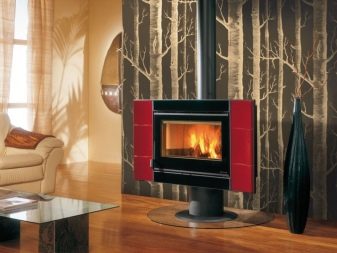
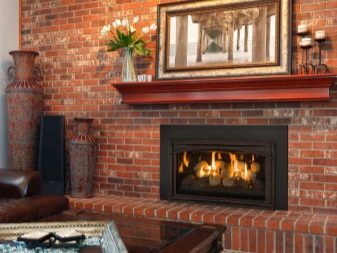
Step-by-step instructions for installing a gas fireplace differs depending on its type and characteristics of the room, therefore, we will give only the most significant and general rules.
- The main element of the device is a burner, which is surrounded by artificial material with a heat-resistant material. Depending on the type of the latter, you can achieve one or another style of the finished accessory.
- To increase heat transfer, the inner walls of the firebox should be expanded from the outside. Heat-resistant doors are also mounted here.
- A control unit is located under the combustion part, which is insulated with heat-insulating material.
- The walls of the smoke box, on the other hand, have a narrowing in the upper part, which ensures the removal of combustion products into the chimney.
- The chimney for gas appliances can have a smaller diameter than the analogue for wood-burning fireplaces. However, the first must necessarily be wrapped in moisture and fire resistant characteristics.
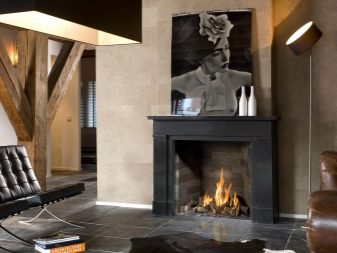
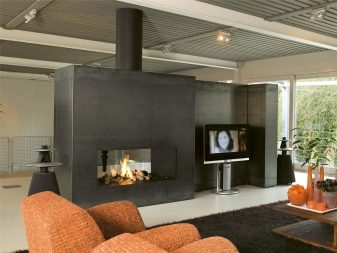
It is more convenient to operate the fireplace in automatic mode. To do this, it should be equipped with carbon dioxide level and tipping sensors. They turn on to prevent carbon dioxide emissions by shutting off the fuel supply.
With a decrease in the intensity of combustion, a special automated device is also used to supply gas in this case. An electric thermostat installed on the fireplace allows you to maintain a constant temperature in the room.
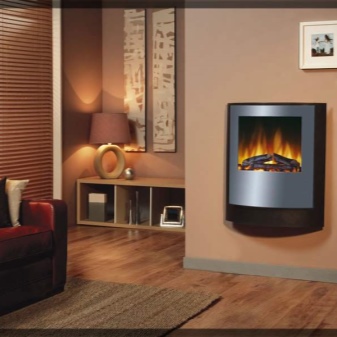
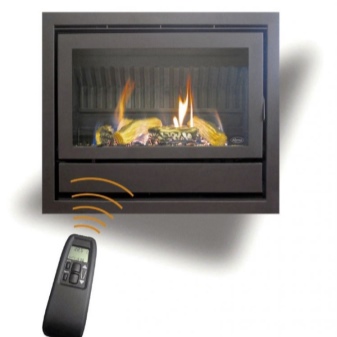
Tips & Tricks
First of all, you should decide on the place of installation of the fireplace, identify the features of the load-bearing walls, rafters and ceiling beams. After that, mentally lay out the paths of the pipes. They should not be too bent or hidden in walls. This is unsafe and inconvenient in the event of a malfunction.
The next parameter is the size of the fireplace and its power. For large rooms with an area of about 100 sq. m, you can choose a large-sized device with a capacity of 10-12 kW.
Pay attention to the presence of additional systems (their presence often avoids unscheduled support and repairs) and accessories. So, for example, it is much more convenient to turn on the fireplace using the remote control. Special devices allow you to increase the intensity of combustion when the flame suddenly goes out, and the automation - problems with igniting the igniter.
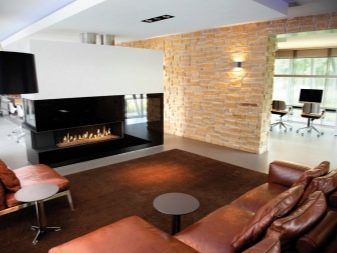
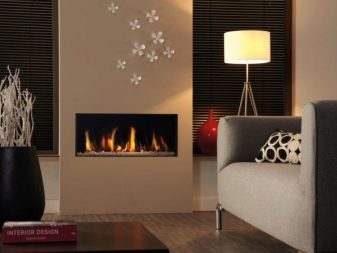
It is important that all its elements are sealed, this will avoid unpleasant odors and gas leaks. Focusing on independent customer reviews, you can determine the range of manufacturers for yourself, and then choose the optimal model.
Manufacturers
Gutbrod keramik
The central place in the products of this German manufacturer is occupied by gas ovens, designed to heat the room.The history of the brand is about 150 years old, and therefore the products are distinguished by reliability, high efficiency rates, and attractive design.
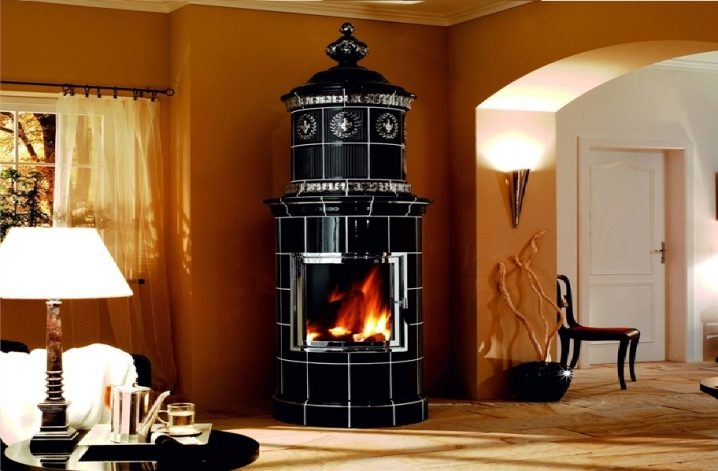
Waco & Co
A Belgian manufacturer of wood and gas appliances that relies on exclusivity in design and finishes with expensive materials. Their products will satisfy the most demanding taste, and the reliability and functionality of fireplaces significantly prolongs their operation.
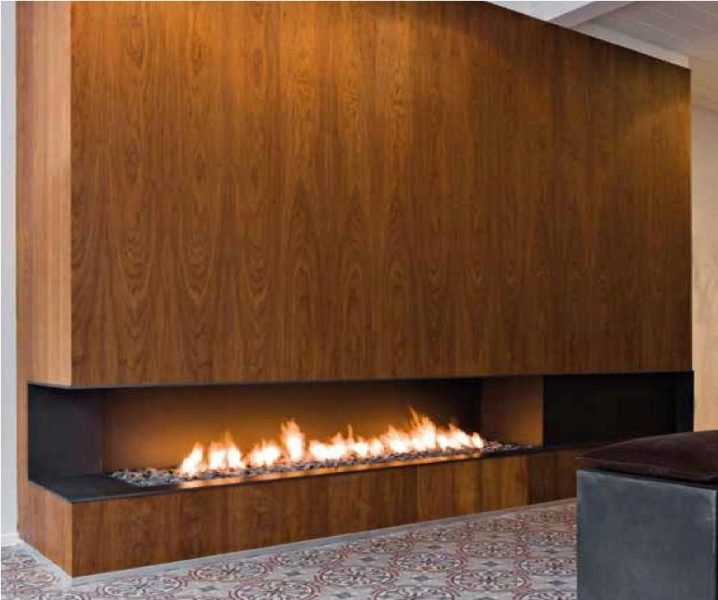
Element4
Gas fireplaces of the Dutch brand are characterized by laconic design. The "stake" was made on the effect of live fire. Thanks to the automation of the process, maintenance of the firebox and fireplaces is minimized. The simplicity of design and the use of inexpensive finishing materials keep these robust and efficient devices affordable.
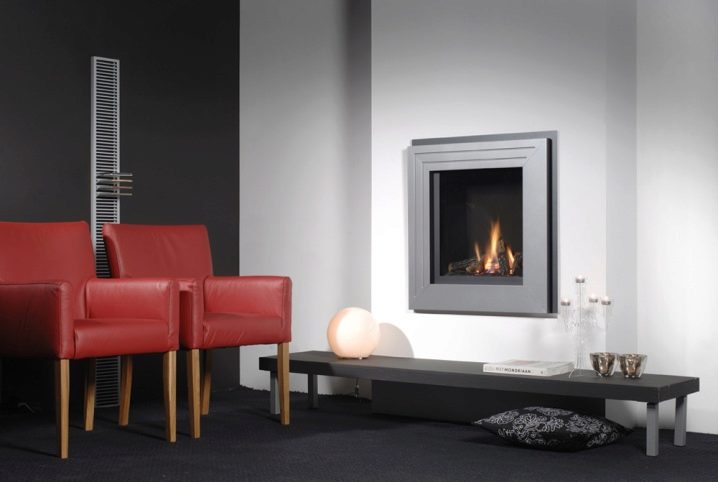
Infire Floor
Country of origin - Iran. In the brand's collection, you can find many models of gas fireplaces for both natural and liquefied gas. The Iranian manufacturer resorts to steel and wood finishes, which ensure the aesthetic appeal of the product and its affordability.
The rather low cost of fireplaces is also due to the fact that they are produced not only in Iran, but also in Russia. Moreover, all fireplaces are certified and manufactured in accordance with Iranian state standards.
A feature of the models is the presence of ceramic firewood in them, which, when burned, give the effect of flickering coals. These fireplaces have both a decorative (especially in the dark due to the flickering of "coals") and a practical function. Their capacity (depending on the model) is sufficient to heat rooms up to 90 sq. m. Users note the unpretentiousness of fireplaces in operation, ease of maintenance.
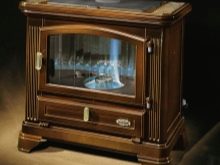
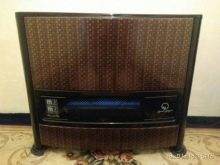
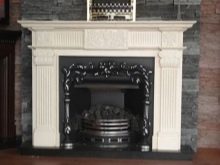
Beautiful examples in the interior
Most often, gas fireplaces are located in the living room. The living room usually serves as a gathering place for households and meeting guests, in addition, it has a lot of air.
When choosing a fireplace, it is important to consider the overall style of the interior. So, for classic living rooms, choose devices lined with brick, ceramic tiles or natural (decorative) stone.
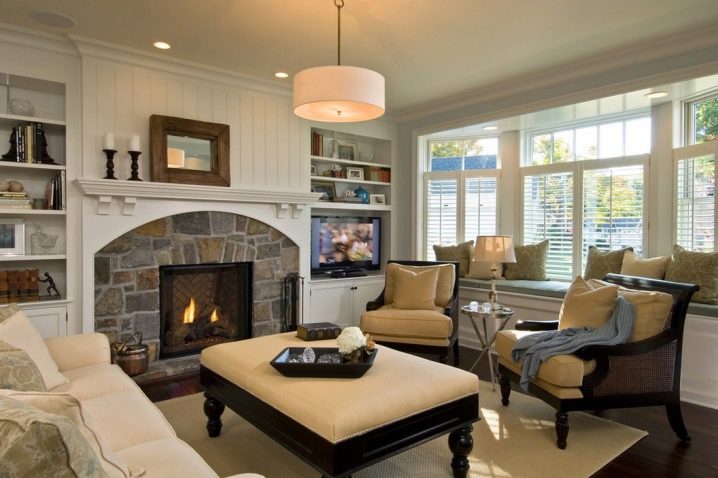
And for rooms in the loft or high-tech style, fireplaces lined with metal, glass, rough brick are more suitable.
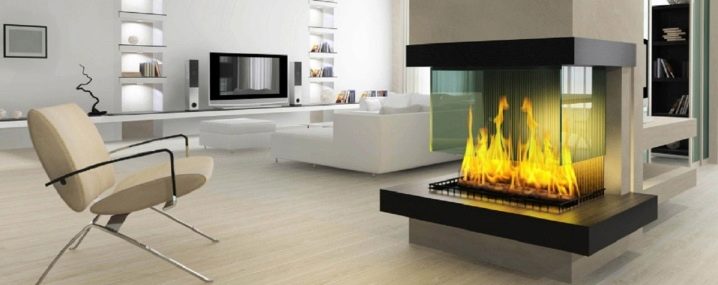
In modern apartments, freestanding, as well as island (or frontal) accessories look harmonious, which also serve for zoning the room.
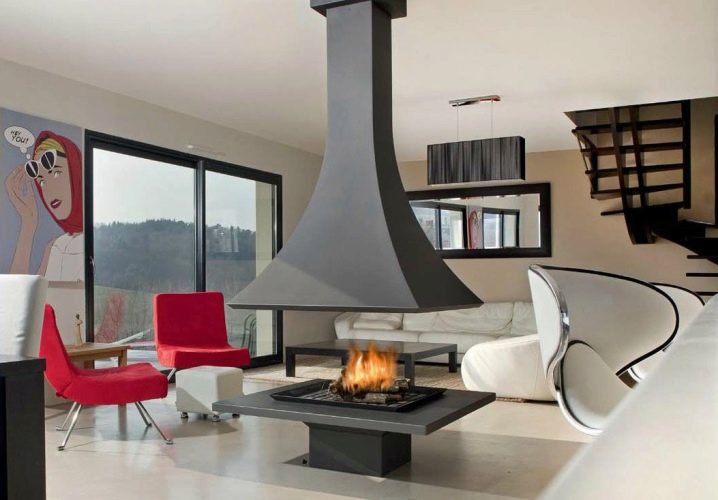
For small rooms, you should opt for a corner design, which can be selected in a classic design or minimalism.
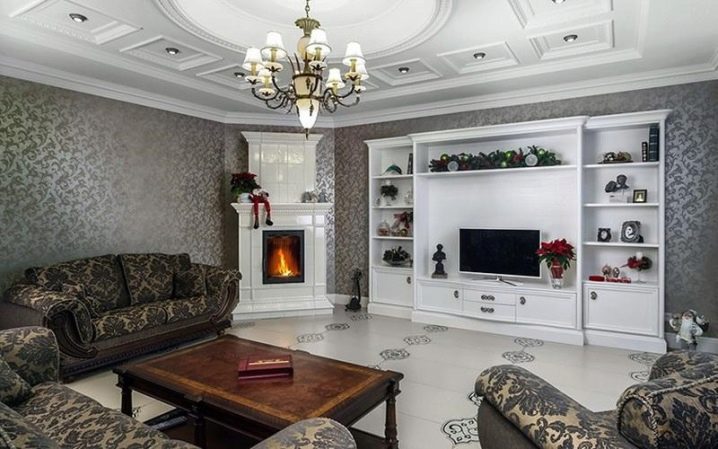
In the kitchen of a country house or summer cottage, fireplace stoves look organic. They serve for heating or cooking food, heating the room, and thanks to the firebox with a glass door, it becomes possible to enjoy a blazing fire. Optimally, such devices look in stylized rustic (including country, chalet, rustic) kitchen styles.
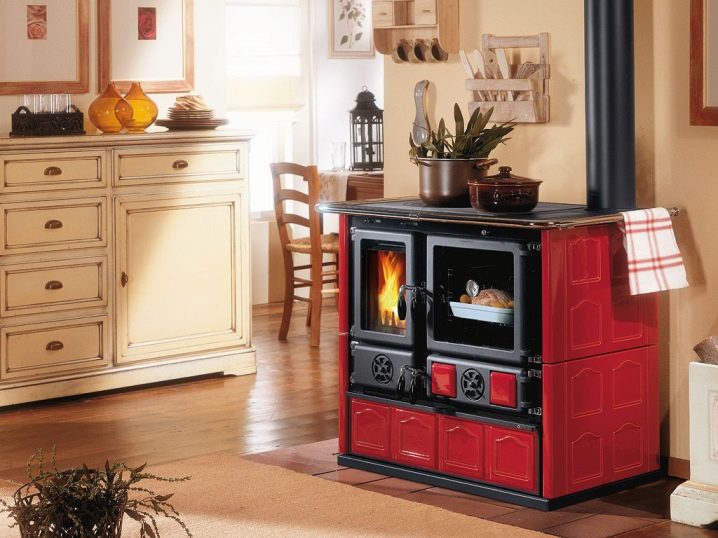
You can learn more about the gas fireplace from the following video.













The comment was sent successfully.